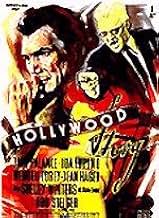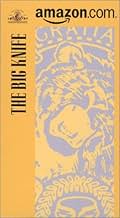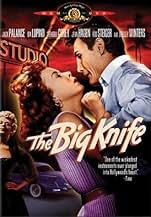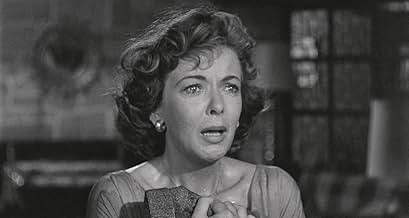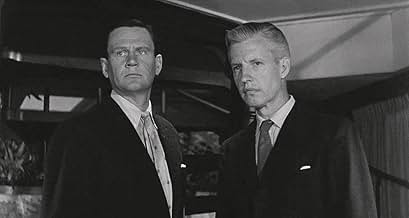CALIFICACIÓN DE IMDb
6.8/10
4.6 k
TU CALIFICACIÓN
Agrega una trama en tu idiomaHollywood actor Charles Castle is pressured by his studio boss into a criminal cover-up to protect his valuable career.Hollywood actor Charles Castle is pressured by his studio boss into a criminal cover-up to protect his valuable career.Hollywood actor Charles Castle is pressured by his studio boss into a criminal cover-up to protect his valuable career.
- Premios
- 1 premio ganado y 2 nominaciones en total
Michael Winkelman
- Billy Castle
- (as Mike Winkelman)
Shelley Winters
- Dixie Evans
- (as Miss Shelley Winters)
Richard Boone
- Narrator
- (voz)
- (sin créditos)
Nick Cravat
- Nick
- (sin créditos)
Robert Emhardt
- Bit Part
- (sin créditos)
Michael Fox
- Prize Fight Announcer
- (sin créditos)
Paula Kyle
- Party Guest
- (sin créditos)
- Dirección
- Guionistas
- Todo el elenco y el equipo
- Producción, taquilla y más en IMDbPro
Opiniones destacadas
Too talky for some, too stage-bound for others, too strident for all, this is not a movie for everyone. Yet The Big Knife continues to fascinate at the same time it annoys. Maybe it's the savage depiction of Hollywood politics and the amoral glamour industry surrounding it. After all, neither blackmail nor murder is off-limits to ego-maniacal studio boss Stanley Hoff ( vintage Rod Steiger), while the human sharks swimming around him behave nothing like opening night at the Oscars. Maybe it's the sterling cast, featuring such 50's exotica as Steiger, Jack Palance, Wendell Corey, and Shelley Winters. In the end, of course, everyone gets to explode on screen except the ice cold Corey whose chronic bemusement proves ultimately more satanic than cynical. Whatever the reason, the result is an over-the-top cavalcade of unusual flair.
It's likely that producer-director Robert Aldrich targeted the film in behalf of blacklisted mentor Abraham Polonsky with whom he had collaborated on 1948's Force of Evil. After all, the year was 1955 and the all-powerful list could not be attacked directly, so what better vehicle than Clifford Odet's corrosive stage play adapted for all America to see. (Odets would do the same for Broadway in 1957's revealing Sweet Smell of Success.) It's fun to imagine how Aldrich's resulting indictment played in studio screening rooms where real reputations were at stake. Then too, much of the film's dirty laundry appears based on fact. The hit and run on Clark Gable's hushed-up 1933 episode; the Palance character on John Garfield's death at 39, listed officially as heart attack. It's hard to picture the producers ever believing such curdled fare would actually make money. Of course it didn't, angering many ticket-buyers with a title that seemed to imply real action instead of endless palaver. Still, this overheated exercise in shameless baroque remains an interesting oddity. A permanent record not only of individual styles, but of artistic protest amidst the throes of cultural repression.
It's likely that producer-director Robert Aldrich targeted the film in behalf of blacklisted mentor Abraham Polonsky with whom he had collaborated on 1948's Force of Evil. After all, the year was 1955 and the all-powerful list could not be attacked directly, so what better vehicle than Clifford Odet's corrosive stage play adapted for all America to see. (Odets would do the same for Broadway in 1957's revealing Sweet Smell of Success.) It's fun to imagine how Aldrich's resulting indictment played in studio screening rooms where real reputations were at stake. Then too, much of the film's dirty laundry appears based on fact. The hit and run on Clark Gable's hushed-up 1933 episode; the Palance character on John Garfield's death at 39, listed officially as heart attack. It's hard to picture the producers ever believing such curdled fare would actually make money. Of course it didn't, angering many ticket-buyers with a title that seemed to imply real action instead of endless palaver. Still, this overheated exercise in shameless baroque remains an interesting oddity. A permanent record not only of individual styles, but of artistic protest amidst the throes of cultural repression.
Bel Air. The well-manicured area of LA where the successful actors, producers and directors in Hollywood live. So says the opening voice- over.
Jack Palance, not the obvious choice for a leading man (& director Robert Aldrich's lame excuse for the film's box office failure) has never been better, nor has he had such a meaty role. His portrayal of pent-up anger and frustration is powerful yet still believable.
He's the washed up star who's unravelling at the seams, wrestling with a dark secret and Rod Steiger, complete with blonde hairdo as his studio manager who is out to keep a lid on bad publicity at all costs. He will stop at nothing at getting a new contract signed.
Ida Lupino is also extremely fine as Charles Castle's (Palance) wife. Their marriage is on the rocks and she pleads that Charles takes the rest that he desperately needs and to not sign. She won't go back to him otherwise. There's good support from tease Shelley Winters and as Charles' agent, Everett Sloane plus Wendell Corey as a ruthless producer.
Much of the action takes place in the Castle's vast living room, nodding to the theatrics of the original play by Clifford Odets.
This is a slow-burning, quite talky, intelligent character-led and well scripted study of Hollywood's mechanics - its layers of people. Not as flashy or melodramatic as some and certainly not as well known, but still directed with surety and skill. Today's viewer will have to adjust to the pace and style but that's easy and the rewards to those attuned can be high.
There's enough depth to the material for a second viewing, which helps bring out the characters even more vividly.
Jack Palance, not the obvious choice for a leading man (& director Robert Aldrich's lame excuse for the film's box office failure) has never been better, nor has he had such a meaty role. His portrayal of pent-up anger and frustration is powerful yet still believable.
He's the washed up star who's unravelling at the seams, wrestling with a dark secret and Rod Steiger, complete with blonde hairdo as his studio manager who is out to keep a lid on bad publicity at all costs. He will stop at nothing at getting a new contract signed.
Ida Lupino is also extremely fine as Charles Castle's (Palance) wife. Their marriage is on the rocks and she pleads that Charles takes the rest that he desperately needs and to not sign. She won't go back to him otherwise. There's good support from tease Shelley Winters and as Charles' agent, Everett Sloane plus Wendell Corey as a ruthless producer.
Much of the action takes place in the Castle's vast living room, nodding to the theatrics of the original play by Clifford Odets.
This is a slow-burning, quite talky, intelligent character-led and well scripted study of Hollywood's mechanics - its layers of people. Not as flashy or melodramatic as some and certainly not as well known, but still directed with surety and skill. Today's viewer will have to adjust to the pace and style but that's easy and the rewards to those attuned can be high.
There's enough depth to the material for a second viewing, which helps bring out the characters even more vividly.
"The Big Knife" is really a stage play recorded on film. It's a Hollywood soap opera that features a lot of good actors eating the scenery. Rod Steiger and Everett Sloan are great as the monstrous studio honcho and weaselly agent, respectively. Jack Palance is a competent actor but was woefully miscast as the sensitive, tortured matinée idol -- nobody would ever confuse Palance with a matinée idol. Nevertheless, he does an adequate job.
The power of the studio system in the '50s is well depicted, if a bit overwrought. Steiger's performance is particularly delicious as his toweringly self-centered character cries, wheedles, and intimidates his underlings into doing what he wants.
The movie is showing its age but its excesses, especially its colorful language, are a lot of fun. Recommended, 7 out of 10.
The power of the studio system in the '50s is well depicted, if a bit overwrought. Steiger's performance is particularly delicious as his toweringly self-centered character cries, wheedles, and intimidates his underlings into doing what he wants.
The movie is showing its age but its excesses, especially its colorful language, are a lot of fun. Recommended, 7 out of 10.
The Big Knife is not for everybody. Some will find it very literate, well-directed and acted(mostly), handling the tense and satire aspects deftly, while others will find it overdone. Both viewpoints are completely understandable, for me there were parts where the film did fall into the latter camp but most of the time it was the former.
As an adaptation of the stage play, which is very compelling and thought-provoking, it is very faithful and translates well adaptation-wise. As a film, it's far from perfect but it comes over well as a film.
There are a few things that don't come off quite as successfully as the rest of the film. Rod Steiger has a very ruthless character, but for my tastes Steiger plays the role too broadly to the point that Hoff felt more of a cartoonish caricature than a real person, to the extent that it came close to hurting the balance of the film and he didn't come over as very threatening. In his performance, there is a lot of camp and scenery-chewing, but not enough of the menace that the role so ruthlessly written needs. The ending does dissolve into contrived melodrama, which is where it is most understandable as to why some will find the film overdone, and felt rushed as well. Lastly, the film does feel over-scored in places, in the places where there is music the blaring music cues felt intrusive.
With the exception of Steiger, the performances are very good. Jack Palance's powerhouse lead performance is one of his best, while Ida Lupino is heart-wrenching and dignified. Wendall Corey wisely underplays and is very entertaining, and Everett Sloane, Jean Hagen(chilling in a role so different to hers in Singin' In the Rain) and a memorable Shelley Winters(in a performance that hits hard) do equally pleasingly. The script is remarkably literate and intelligent, with the tension being portrayed quite realistically and the satire being boldly lacerating. The story moves deliberately, but the tension present is enough to haunt the mind and the subject matter is a bold one and told in a biting, sometimes fun and poignant way. The Big Knife is photographed with class and atmosphere, the production values are appropriately claustrophobic and Robert Aldrich's direction is more than able, often excellent.
Overall, a very acquired taste, but for this viewer while not without flaws it was a well done film. 7/10 Bethany Cox
As an adaptation of the stage play, which is very compelling and thought-provoking, it is very faithful and translates well adaptation-wise. As a film, it's far from perfect but it comes over well as a film.
There are a few things that don't come off quite as successfully as the rest of the film. Rod Steiger has a very ruthless character, but for my tastes Steiger plays the role too broadly to the point that Hoff felt more of a cartoonish caricature than a real person, to the extent that it came close to hurting the balance of the film and he didn't come over as very threatening. In his performance, there is a lot of camp and scenery-chewing, but not enough of the menace that the role so ruthlessly written needs. The ending does dissolve into contrived melodrama, which is where it is most understandable as to why some will find the film overdone, and felt rushed as well. Lastly, the film does feel over-scored in places, in the places where there is music the blaring music cues felt intrusive.
With the exception of Steiger, the performances are very good. Jack Palance's powerhouse lead performance is one of his best, while Ida Lupino is heart-wrenching and dignified. Wendall Corey wisely underplays and is very entertaining, and Everett Sloane, Jean Hagen(chilling in a role so different to hers in Singin' In the Rain) and a memorable Shelley Winters(in a performance that hits hard) do equally pleasingly. The script is remarkably literate and intelligent, with the tension being portrayed quite realistically and the satire being boldly lacerating. The story moves deliberately, but the tension present is enough to haunt the mind and the subject matter is a bold one and told in a biting, sometimes fun and poignant way. The Big Knife is photographed with class and atmosphere, the production values are appropriately claustrophobic and Robert Aldrich's direction is more than able, often excellent.
Overall, a very acquired taste, but for this viewer while not without flaws it was a well done film. 7/10 Bethany Cox
The Big Knife is a mostly good adaptation of a Clifford Odets play about a Hollywood actor who's being blackmailed into studio servitude while trying to patch up his failing marriage. This is a movie for which the word powerful was truly invented. Most of the film takes place on one set and places heavy emphasis on speeches from the individual characters for its really riveting moments (as I would expect from a stage play), but those moments definitely get across. The whole cast is good, but Jack Palance in a nuanced and fiery performance as the actor Charlie Castle, and Rod Steiger, giving a deeply felt and passionate realization of the corrupt studio boss are nothing short of superb. The screenplay is full of smart, incisive, biting dialogue as well. Except for a melodramatic turn at the end, that, for me, takes a lot of the edge off the story, this is a well-acted film that is solid, though not spectacular, entertainment. 3*** out of 4
¿Sabías que…?
- TriviaBecause of its vitriolic take on Tinseltown, this was unsurprisingly turned down by all the major studios in Hollywood. It eventually found a home at United Artists.
- ErroresThe camera and operator are visibly reflected in one scene in the living room.
- Citas
Smiley Coy: A woman with six martinis can ruin a city.
- Créditos curiososIn the opening credits: Upholstered furniture by Martin/ Brattrud.
- ConexionesFeatured in Les dossiers de l'écran: Les coulisses du cinéma (1970)
Selecciones populares
Inicia sesión para calificar y agrega a la lista de videos para obtener recomendaciones personalizadas
- How long is The Big Knife?Con tecnología de Alexa
Detalles
- Fecha de lanzamiento
- País de origen
- Idioma
- También se conoce como
- Hollywood-Story
- Locaciones de filmación
- Productora
- Ver más créditos de la compañía en IMDbPro
Taquilla
- Presupuesto
- USD 423,000 (estimado)
- Tiempo de ejecución1 hora 51 minutos
- Color
- Relación de aspecto
- 1.85 : 1
Contribuir a esta página
Sugiere una edición o agrega el contenido que falta

Principales brechas de datos
By what name was The Big Knife (1955) officially released in India in English?
Responda

